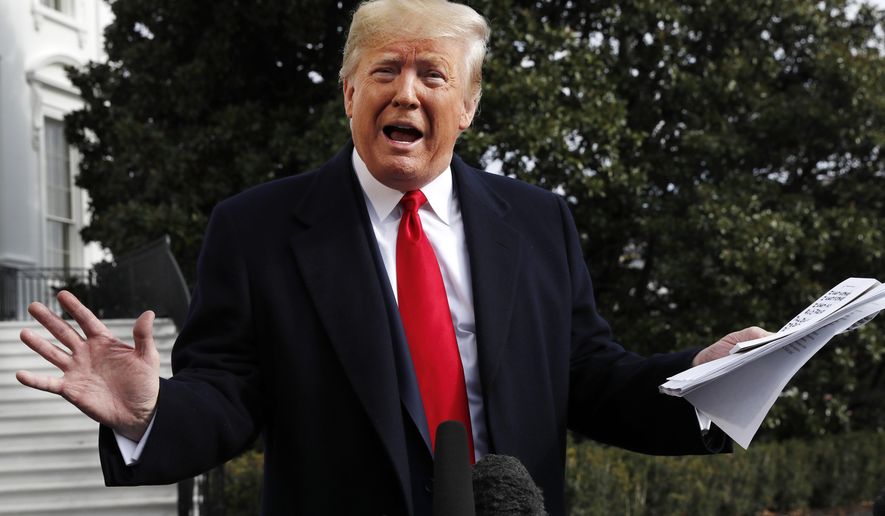WASHINGTON (AP) - On the same day that members of Congress learned of a whistleblower complaint that would trigger impeachment hearings, President Donald Trump uttered 12 words that he claims establish his innocence.
“I want nothing. I want nothing. I want no quid pro quo,” the president told a U.S. diplomat in the September phone call. Questions were swirling by then about Trump’s motivations for holding up U.S. security assistance for Ukraine as he pressed the country’s leaders to investigate his political rivals.
“Tell Zelenskiy - President Zelenskiy to do the right thing,” Trump added in his conversation with his ambassador to the European Union, Gordon Sondland.
Reading from a page of Sharpie-scrawled comments on an Air Force One notepad, Trump re-enacted the conversation in dramatic fashion Wednesday on the South Lawn and insisted it should dispel the impeachment cloud over his head. Trump’s takeaway: “Not only did we win today, it’s over.”
But his comments came midway through a day of damaging testimony for the president in which Sondland told House investigators that he worked with Trump’s lawyer, Rudy Giuliani, on Ukraine at the “express direction” of the president and that he pushed for a political “quid pro quo” with Kyiv because that was what Trump wanted.
The comments appear to be just the kind of verbal base-covering that has allowed the president to repeatedly escape legal peril in various brushes with the law over the years. Trump talks in what some who have worked with him described as an oblique, even mob-like “code” in which actions are implied or vaguely suggested without explicit directions. Adding to Trump’s ability to deny culpability, he does not use email or text messaging - preferring phone calls and in-person conversations.
Former Clinton special prosecutor Ken Starr called Wednesday a “bombshell day” that “doesn’t look good for the president substantively.” Even so, Starr concluded, the president’s “I want nothing” remark to Sondland may have given him a reprieve.
“The president may have covered himself by saying ‘no quid pro quo,’” Starr said on Fox News, even if “the record is muddy, the record is murky.”
That’s just the way Trump likes it.
“He doesn’t give you questions, he doesn’t give you orders,” his former longtime personal attorney and fixer Michael Cohen, who is now imprisoned on tax evasion and campaign finance charges, explained to lawmakers earlier this year. “He speaks a code, and I understand the code because I’ve been around him for a decade.”
Former Trump campaign adviser Sam Nunberg objected to that characterization, but said Trump was typically careful to share things only on a need-to-know basis.
“I’m very surprised that the president got himself into a situation where he has exposure by so many people,” said Nunberg, “because in my past experience, he’s always been careful to compartmentalize and to make sure that his actions are not left up for multiple interpretations.”
Trump’s September phone call with Sondland has also been a topic of dispute. Tim Morrison, a former National Security Council staffer who spoke with Sondland after the call, said Sondland told him that while the president swore off any quid pro quo, at another point in the chat, Trump told the diplomat that Ukrainian President Volodymyr Zelenskiy must personally announce the opening of the investigations - and should want to do it.
However, Sondland testified Wednesday that he couldn’t remember Trump ever telling him directly the aid would be held up until the statement was made.
The circumstances surrounding the phone call that Trump has seized on are also notable. Sondland called Trump after receiving what he described as a “fairly shocking” text message from the acting ambassador to Ukraine, Bill Taylor, expressing concerns about the Ukraine situation.
Taylor had texted Sondland, “As I said on the phone, I think it’s crazy to withhold security assistance for help with a political campaign.”
Sondland said Trump was in a bad mood. That same day, members of Congress learned of the whistleblower complaint that would trigger the impeachment inquiry.
Nearly five hours later, Sondland responded, after his conversation with the president.
“Bill, I believe you are incorrect about President Trump’s intentions,” he wrote. “The President has been crystal clear: no quid pro quo’s of any kind.” Sondland also suggested that the two stop conversing by text and that Taylor raise any remaining concerns by phone.
Sondland later testified that he had been relaying in the text what Trump had told him, not indicating what he personally believed.
He told lawmakers Wednesday that he was never explicitly told by Trump that the release of the aid was conditioned on Ukraine launching investigations into the president’s rivals. But Sondland said that was his “presumption” and was as obvious to him as “two plus two equals four.”
Still, he said every conversation he’d had with Trump has been “fairly direct and straightforward.”
Democrats said the opaque language wasn’t enough to clear Trump.
“My colleagues seem to be under the impression that unless the president spoke the words ‘Ambassador Sondland, I am bribing the Ukrainian president,’ that there’s no evidence of bribery,” Rep. Adam Schiff, D-Calif., the chair of the House Intelligence Committee, said Wednesday. “And nonetheless, Ambassador, you’ve given a lot of evidence of precisely that conditionality of both the White House meeting and the military assistance.”
___
Follow Miller and Colvin on Twitter at https://twitter.com/colvinj and https://twitter.com/ZekeJMiller




Please read our comment policy before commenting.